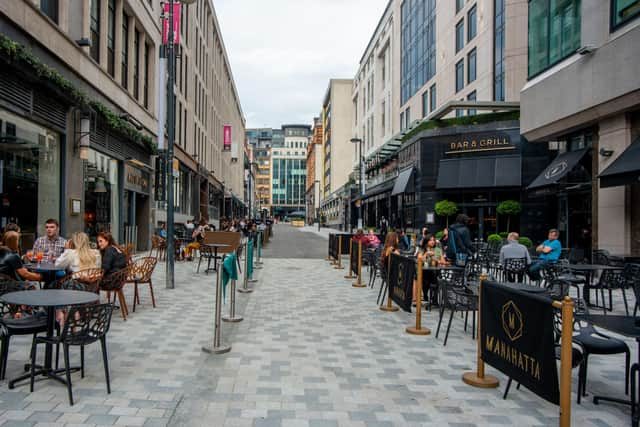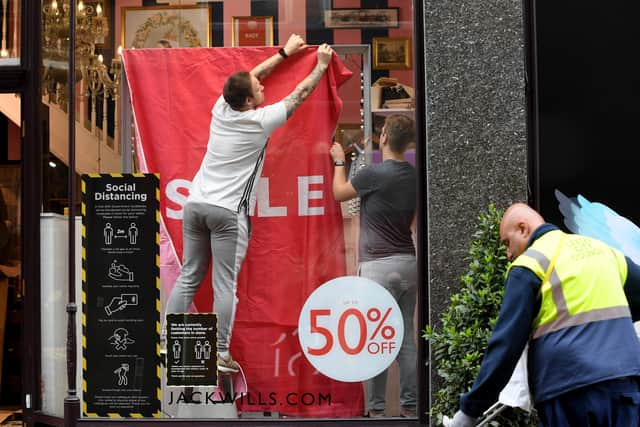Homeworking is an unhappy way forward for society – David Blunkett


Of course, there are many people who have been at home and unable to work, 9.6 million of whom have been furloughed and now find themselves with great uncertainty as employers start to make harsh decisions about redundancy.
Many others have not had the luxury of being able to work from home because their job entails them travelling to work to keep food and energy supplies, refuse collection, public transport and, of course, health and social care functioning.
Advertisement
Hide AdAdvertisement
Hide AdSome of the senior staff may live in homes sufficiently large to accommodate day-to-day living together with a suitable working environment, whilst many others will be struggling to escape the normal sounds and interruptions of family life.


For some involved in information technology, it has already been both convenient and feasible for a considerable period of time.
Recent advances had already made it possible for people to spend part of the week working from home, whilst still keeping in close touch with colleagues and holding face-to-face meetings when appropriate.
But the fashionable view now is that most of those who are in office-based jobs could spend all – or at least a substantial part – of their working life at home.
Advertisement
Hide AdAdvertisement
Hide AdThose enthusiastically espousing what they see as a better world believe that this would lead to fewer people travelling, less pollution, more time with the family, and a rosy view of how this would improve things for all of us.


Just a little thought, however, and drawing on a great deal of experience, might lead us to an entirely different conclusion.
Leave aside for the moment the point already made that most people don’t live in large houses which facilitate one or more rooms (these days there’s more than one person likely to be working), in which peace and quiet, as well as comfort, can be assured.
The average dining room table and chair are unlikely to have passed any ‘work place assessment’ in relation to the user’s wellbeing.
Isolation is bad for you. That is a simple fact.
Advertisement
Hide AdAdvertisement
Hide AdWe are gregarious as human beings, we learn from each other. We interact with each other, and we do so best when face-to-face.
There will be those who have taken easily to operating over Zoom, Teams or Skype. Many more have found it not only frustrating but exhausting. Half the time the technology works intermittently, discussion is at best stultified and nuance, humour and irony are virtually impossible to achieve.
In other words, our interaction, even when the technology is at its best, is of a very different nature to the normal human contact.
There is also the little matter of exercise, change of environment and wider experience. Yes, travelling to work can often be a real nightmare. There is enormous room for improvement, innovation and creativity in future development of public transport, and fewer people using private cars.
Advertisement
Hide AdAdvertisement
Hide AdHowever, going to work is in itself a critical part of the structure of our day, the rhythm of our life and the way in which we avoid the dangers of depression and the challenges to our mental health.
Sitting in the same chair, experiencing the same four walls, having to deliberately carve out time whilst fitting in with other people’s work patterns in order to simply take a walk and get some air is, month after month, year after year, not a happy prospect.
History teaches us that when major societal change takes place, there are winners and losers.
When, for instance, the very large employers in steel and engineering required only a fraction of the number of employees for the same output, it wasn’t just the human cost of redundancy that resulted.
Advertisement
Hide AdAdvertisement
Hide AdThere was also the breakdown of social interaction, when the workplace had been the source of many friendships, of contact and social life outside of work as well as within it.
Social solidarity was eroded. Individualism and isolation go hand-in-hand.
Whilst people have certainly helped each other enormously with millions of examples of simple acts of kindness throughout the pandemic, and particularly in the early period of lockdown, there is little sign that this mutuality and sense of community is being carried forward to the future.
Insecurity and uncertainty leads not to people coming together, but rather to instinctive self-preservation and, if the past is anything to go by, selfishness.
Advertisement
Hide AdAdvertisement
Hide AdThat is why with whatever safeguards are needed, the sooner we put technology in its place, as an aid and a support but not our master, the better for our health and the better for the future of our society.
Equating working at home with working less is a misnomer.
Failing to understand that work is good for us, not just because we earn an income and have a purpose in our lives but also because of the structure it provides, will miss the point of why unemployment is not just an economic hit, but a personal disaster.
For all of us, getting back to the ”old normal” as soon as possible, makes good human as well as economic sense. We need work, but we also need each other.
David Blunkett is a Labour peer and a former Home Secretary.
Advertisement
Hide AdAdvertisement
Hide AdEditor’s note: first and foremost - and rarely have I written down these words with more sincerity - I hope this finds you well.
Almost certainly you are here because you value the quality and the integrity of the journalism produced by The Yorkshire Post’s journalists - almost all of which live alongside you in Yorkshire, spending the wages they earn with Yorkshire businesses - who last year took this title to the industry watchdog’s Most Trusted Newspaper in Britain accolade.
And that is why I must make an urgent request of you: as advertising revenue declines, your support becomes evermore crucial to the maintenance of the journalistic standards expected of The Yorkshire Post. If you can, safely, please buy a paper or take up a subscription. We want to continue to make you proud of Yorkshire’s National Newspaper but we are going to need your help.
Postal subscription copies can be ordered by calling 0330 4030066 or by emailing [email protected]. Vouchers, to be exchanged at retail sales outlets - our newsagents need you, too - can be subscribed to by contacting subscriptions on 0330 1235950 or by visiting www.localsubsplus.co.uk where you should select The Yorkshire Post from the list of titles available.
Advertisement
Hide AdAdvertisement
Hide AdIf you want to help right now, download our tablet app from the App / Play Stores. Every contribution you make helps to provide this county with the best regional journalism in the country.
Sincerely. Thank you.
James Mitchinson
Editor
Comment Guidelines
National World encourages reader discussion on our stories. User feedback, insights and back-and-forth exchanges add a rich layer of context to reporting. Please review our Community Guidelines before commenting.